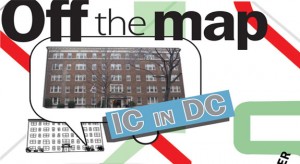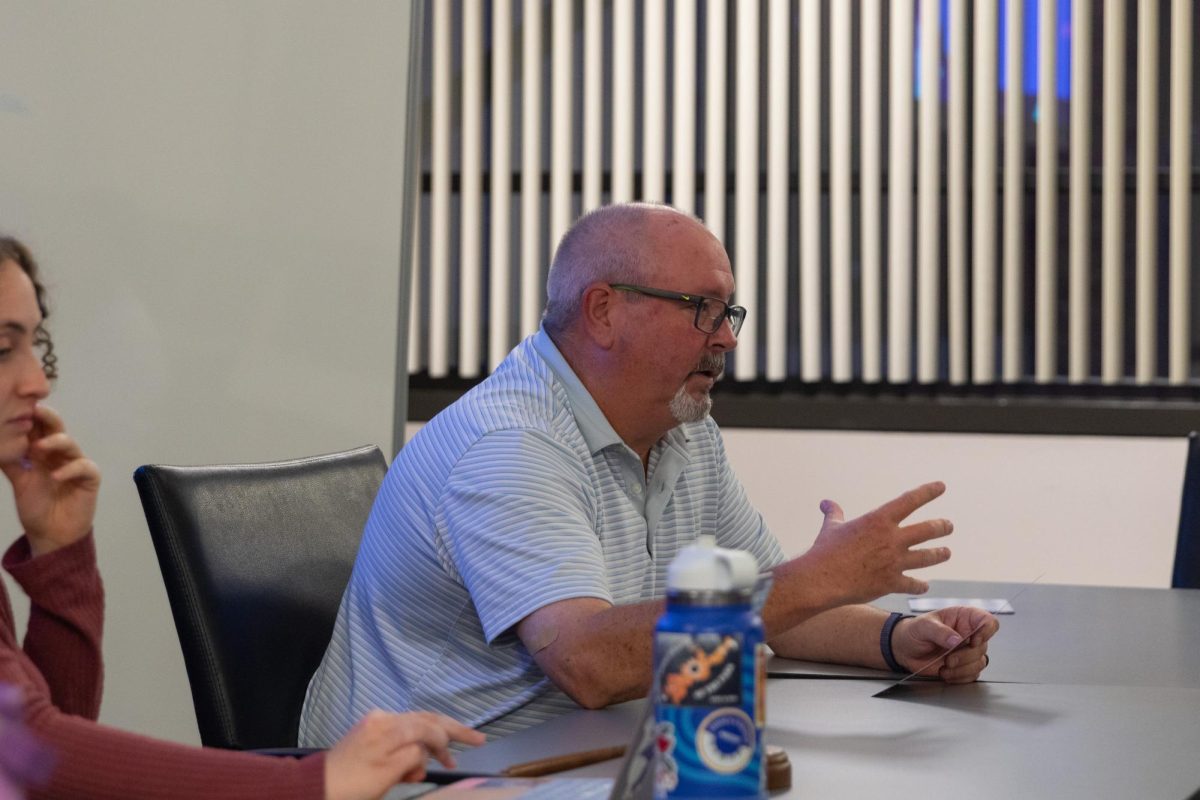Senior Molly Wernick anticipates a career in the nonprofit sector, so she applied to Ithaca College’s Washington Semester Program, knowing the nation’s capital is also the capital of national nonprofits. After being awarded a communications and membership internship at the Center for Nonprofit Advancement, Wernick was ready to spend a semester in Washington, D.C.

“This experience is kind of like my training wheels to what comes May 23 when I am no longer in college,” Wernick said.
However, this personal and professional experience comes with often frustrating inconveniences.
Though several students said while they enjoy the program and do not regret their decision to enroll, they also expressed concerns with limited course options, housing policies and the stagnant low interest in the program.
Tom Bohn, the former Washington Program director from Spring 2005 to Summer 2008, said the program was designed in the mid-to-late 1990s after the Los Angeles Program began to flourish. Bohn said he and faculty members were seeking an internship-focused program like L.A., to appeal to students of different majors, such as politics, journalism, art and sociology.
During his tenure as director, Bohn said, program enrollment never reached his goals of between 20 and 30 students per semester, double the average enrollment. Enrollment has remained steady at an average of 10-15 students throughout the program’s history.
With a limited number of course options, Bohn said students are discouraged from enrolling in the program for fear that they’ll be unable to meet the college’s course requirements.
“In a sense, you are taking a semester out,” he said. “You’re kind of just removing yourself from Ithaca College.”
The program offers two courses each semester and three one-credit weekend seminars, Deborah Curry, director of the program, said. This semester, the core courses are “Media and Politics,” taught by John Milewski, a television radio host at the Woodrow Wilson Center for International Scholars, and “The Arts of Public Washington,” taught by Heather Bowling, an art history lecturer. Each course meets once a week for about two and a half hours in the same apartment building where students live.
As part of the D.C. program, students are required to maintain 12 credits to be full-time. Curry said students typically carry a six-credit internship and take at least two three-credit courses.
Junior Rebecca Coffman said attending a three-hour night class after a full day’s work can be difficult, but she said the professors are generally understanding of students’ internships and assign less work than classes at the Ithaca campus.
“It’s kind of annoying to get to class, but once we’re there, everyone’s really engaged and everyone participates,” she said. “It’s not bad at all.”
Though she said she enjoys both classes, Coffman said the limited number of course options is a drawback to the program, as both classes revolve around specific subject areas — art and politics — that not all students are interested in.
“You either like art, or you don’t like art,” she said. “So if you don’t like art, you hate that class.”
Curry said the program has always offered two courses and three seminars. Students are not required to take the courses offered in Washington, and students can opt to take online courses through the college while studying away.
Wernick said more course options would be ideal and would give more leeway to students who may be unable to enroll in the program while simultaneously meeting degree requirements.
“If they had more courses to offer, that would be incredible,” she said. “I wouldn’t have had that initial stress of, ‘Is this something I can do because it may or may not meet my academic needs?’”
When students arrived at the Woodley Park residential area, owned by Washington Intern Student Housing, the semester began on a promising note.
Students said the apartments are in a safe neighborhood, sitting on Connecticut Avenue close to the Metro line and National Zoo. From there, students said their initial impressions went downhill.
Wernick said the apartments were “bland,” “unfortunate” and contained a litany of imperfections such as unlevel floors, tough mattresses, missing refrigerator shelves and a mixture of mold and rust under the shower handle.
Prior to WISH’s management, Boston University managed the building. Curry said on Dec. 31, the university’s management lease expired, and the college chose not to renegotiate. As a result, WISH now manages the property, which includes housing, classrooms and office facilities. Students are required to live in the Woodley Park property.
Coffman said she first realized the problems with WISH’s “ridiculous and completely obsolete policies” when students wanted to host family and friends. WISH policy dictates that only same-sex overnight guests are permitted in the apartments.
“[The guest policy is] oppressive by gender, which especially goes against Ithaca College’s attitude,” Coffman said.
Under WISH rules, guests must be approved by roommates and registered by the building manager. Guests can’t stay longer than two nights without special permission from the building manager.
Junior Elizabeth Kinsman said she did not foresee such strict housing policies when she decided to spend a semester in Washington.
“We are all coming from college residence hall policies, but this seemed a little extreme,” she said.
One WISH rule prevents any open flames and another prohibits alcohol consumption in the apartments if any resident assigned to live in the unit is under the age of 21. Wernick said she worried these policies would prevent her from properly celebrating the Shabbat, or Sabbath.
As a Jewish custom in recognizing the Shabbat, a blessing is placed on candles on Friday evenings, and after the lighting of candles and washing of the hands, there is a blessing over wine, she said. With the help of Curry, Wernick said accommodations were made to allow her to normally observe the Shabbat in her room.
Curry said the WISH rules are stricter than Boston University’s policies, which the college, as well as other schools, asked WISH to continue.
Dan Lewis, general manager of WISH, declined to comment on student concerns.
Curry said the policies are WISH’s trial rules for the spring semester, meaning they are subject to change with deliberation based on balancing student preferences with WISH’s privacy, safety and liability concerns. It is ultimately WISH’s decision as to what policies are enforced, she said.
“The whole relationship is developing, is evolving,” she said. “[WISH is] trying to kind of feel their way as to where the policies should be.”
The program generally attracts between 10 and 15 students a semester, with a higher enrollment in the spring than fall. Under his watch, Bohn said the highest enrollment count was 24 in Spring 2006.
Consistently, enrollment numbers for the Washington program have remained lower than those for the college’s London and L.A. programs.
Bohn said it would take more students to force the college to accommodate better housing and more class options and faculty.
“It’s a little hard to commit extensive faculty or administrative resources to a program that enrolls 10 to 15 students per semester,” he said.
Curry said interest in the D.C. program may be small in comparison to London and L.A., but she doesn’t view the two as competitors. Instead, she said the three all offer their own advantages to different sources.
To market the program, Curry speaks to classes and department heads, hangs posters around campus and host information sessions.
Karen Emnett, manager of administrative operations in the Office of the Provost, said the college allotted the program a budget of $230,000 for this academic year. Despite the low enrollment, she said the program’s budget has not varied significantly in recent years, nor is it expected to change in the near future. She said it’s difficult to determine the program’s budgetary impact because the amount of students it attracts to the college is incalculable.
“Having IC students studying off campus, such as in D.C., L.A. and London, opens up opportunities for other students to attend IC and live on campus as well,” she said. “Thus, the budget implications aren’t just about tuition and costs inside an individual program like D.C. It’s a bigger conversation.”
“It’s kind of an invisible program,” Bohn said. “It always has been.”
Bohn said students aren’t as interested in Washington as they are with London and LA. Bohn said London offers an “exotic” abroad experience, and L.A. enjoys strong connections to the Park School curriculum.
“The students themselves have to have an interest in going,” he said. “For an awful lot of students, Washington and the internships in Washington and the courses in Washington don’t seem to quite link with where they’re going.”
Curry said she plans to offer online classes and independent studies to enhance flexibility in meeting the college’s course requirements.
“What we’re seeing ourselves as a program is being a leader of experiential education and civic engagement and leadership,” she said.
Even though she said the program has some negatives, Wernick, similar to other students, said it has opened her eyes to the possibilities made available to students at the college.
“I came down so I could figure out my future,” she said. “Now, I have so much more exposure and perspective — and curiosity more than anything — of what’s out there.”







